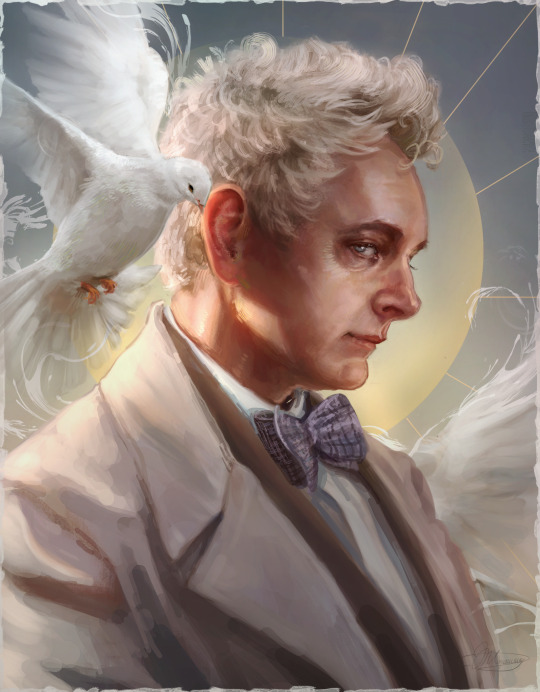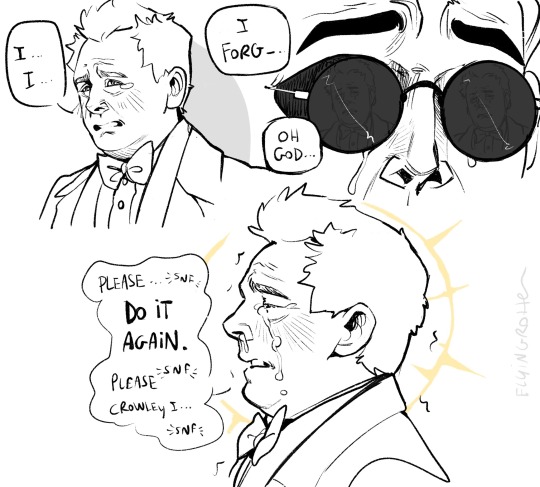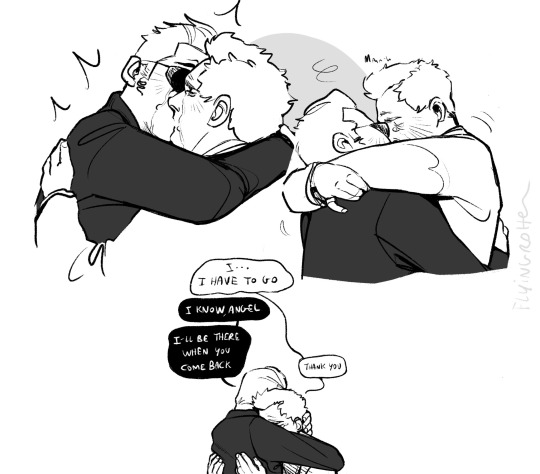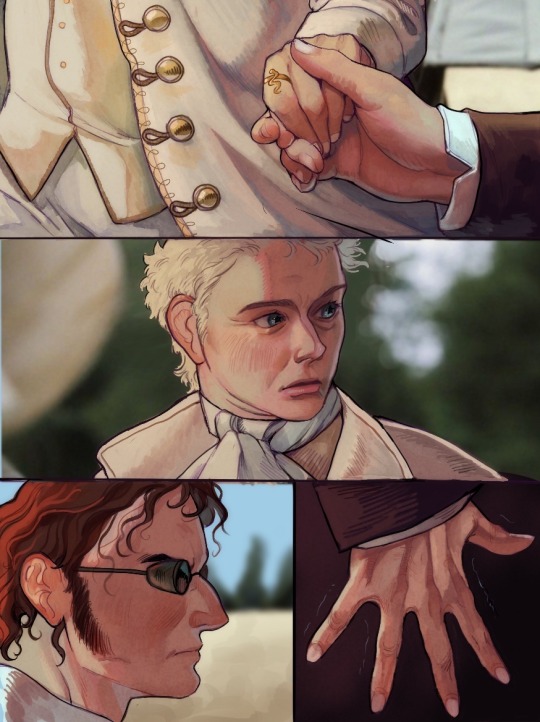Text
I've seen a number of posts taking Aziraphale to task for hesitating over the word "friends" in 1941 and here's my take.
Neither of them names their relationship before 1941. It's always The Arrangement, and they deny anything else because Heaven and Hell are always listening/watching (many many great metas on their coded language elsewhere so I won't get into it here).
But then this happens in 1941:
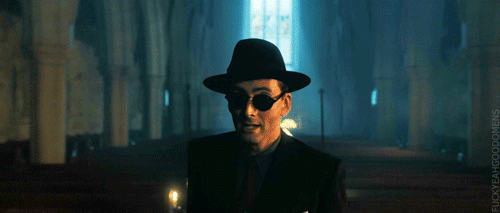
"It would take a real miracle for my friend and I to survive it."
Crowley just SAYS it. (Code again, always, but said out loud.) Then the books. The touch. The "oh."
It's not JUST the books. It is that Crowley has NAMED them, named this. Admitted what they had to deny in 1601.
So not a half hour later Aziraphale says this. In public!

He takes the very next possible opportunity to communicate to Crowley - "I heard you. I understood you. I feel the same."
AND JUST TO BE SURE, he says it again, in private, with softness in his look and his voice.

Look at the way he glances away just before the word friends. He wants to use another word, but can't. So he will say it again, in code, but again so Crowley understands.
"I see you. I understood. I understand. I feel the same."
5K notes
·
View notes
Text
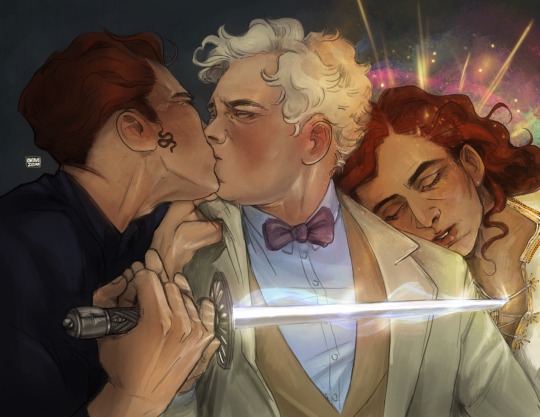
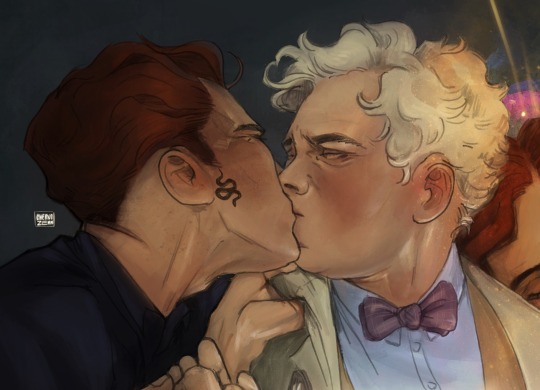
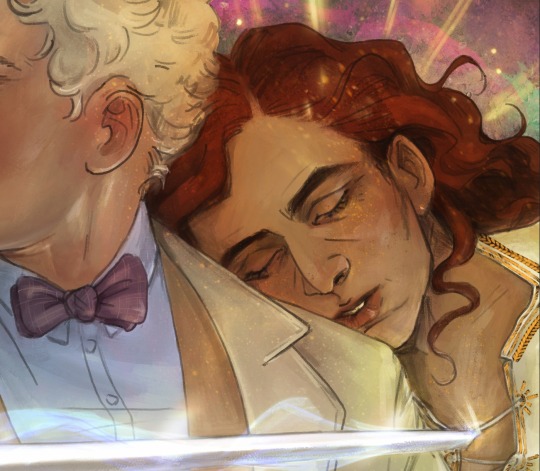
Don't go calling after ghosts.
I am here - flesh, blood, bone
and devotion.
21K notes
·
View notes
Text
What is love?
Well, according to Neil Gaiman...
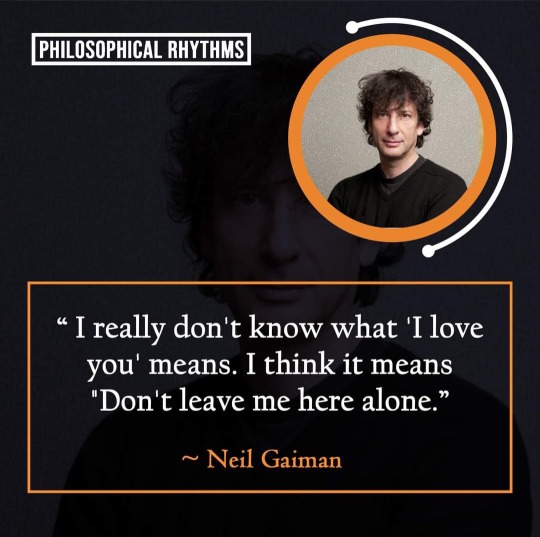
And I'll just drop this here...
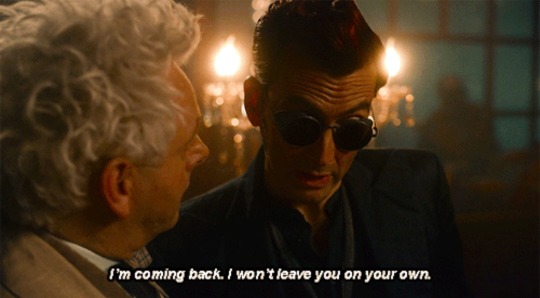
You know, just in case the Good Omens fandom hadn't cried enough today.
...
15K notes
·
View notes
Text
we do not talk enough about the moment right before crowley puts his sunglasses back on. the "nothing lasts forever" is devastating and if you're like me your eyes were so full of tears you couldn't see the screen the first time you watched it (just like crowley, look at us all twinning in sadness!).
there is a shift that happens in his eyes and i think it is absolutely fascinating and heartbreaking at the same time.
we begin with crowley averting his gaze from aziraphale's face and staring off into the distance instead, and you can see his spirit break. that crowley just lost the one thing in the world he cannot live without and we can see it written across his face like a neon sign.

then, as you'd expect, he gives into the need to cover up his pain, to try and make himself less vulnerable, and even before he lifts his glasses he looks down so aziraphale can no longer see his eyes.
now, the next part is what would not let me out of its grasp all day. we know it happens because of his demeanour afterwards and up until the kiss, but you can actually watch as crowley makes himself numb to the world.
i am intimately familiar with dissociation as a trauma and stress response, and while you can never fully control it, you do eventually find the switch in your mind that makes you snap back into the haze. crowley has had six thousand years to get really, really good at leaving reality behind when he needs and/or wants to.
that's exactly what he does.

he still looks sad, and yet there's just something distinctly distant in his eyes, the shift from openly heartbroken to "i don't want to feel any of this let me leave".
glasses? on
emotions? off
hotel? trivago
i have stared at those four frames more than any person probably should and i don't know if it's the light, if i am going insane, or if there is a single tear sliding out of his right (our left) eye. i'm probably insane and the light is a bitch so if anyone has some high resolution shots or anything that could answer that question without a doubt PLEASE do add it.
by now you are probably ready to threaten me with a knife in a dark alley but before you do that or drive your car off a cliff, let me tell you the best part:
aziraphale notices.
they might be communicating on two different frequencies but aziraphale knows crowley. he knows and loves him, and, most importantly, over the last few years he has gotten used to seeing crowley without his glasses. aziraphale could probably write a book on the expressions in his eyes alone and watches that shift happen and is devastated.
look.
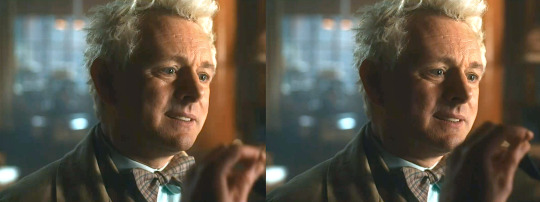
he tries to make himself hope the same second, tries to convince himself crowley is putting on his glasses so they can leave together, but he knows.
aziraphale sees the light leave crowley's eyes, sees crowley leave, knowing that he is quite literally running away from him. you and me against the world, angel, but in that moment crowley firmly pushes him back to "the world" (or tries to, anyway).
the entire season we see crowley take off his glasses whenever he enters the bookshop to the point where he's running around without them on in broad daylight with jimbriel right there.
can you imagine how hurt and confused aziraphale must be?
because what crowley is telling him, if we really, really break it down, is that aziraphale is no longer a safe person for him. and repairing that trust is going to take time and work, no matter how much crowley loves him, how badly they love and need each other.
anyway to seal this off and really rub in the pain - how it started vs. how it ended. <3
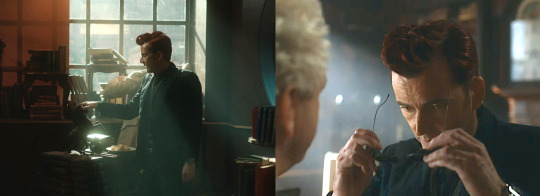
oh one last thing: now crowley no longer has a single person he can be himself around, no one that knows him, no one he trusts. no one in whose presence he can take his glasses off.
and outside of the bentley and his own flat, he no longer has a place to do so either. the bookshop was theirs. with aziraphale gone, is it really a safe place anymore? is it somewhere he can just let himself be knowing he will be looked after and protected?
easy answer: no.
alright, off i go. see y'all on the next angst post or in the tags.
3K notes
·
View notes
Text
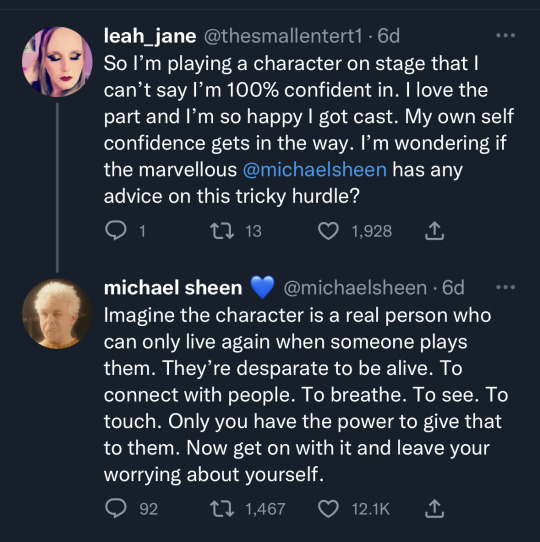
this is such incredible advice for creating any kind of art i have to put it over here to remind myself
51K notes
·
View notes
Text
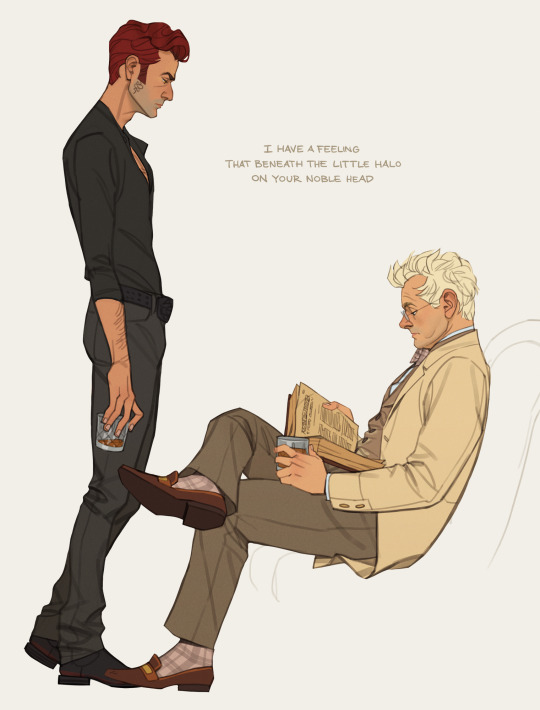
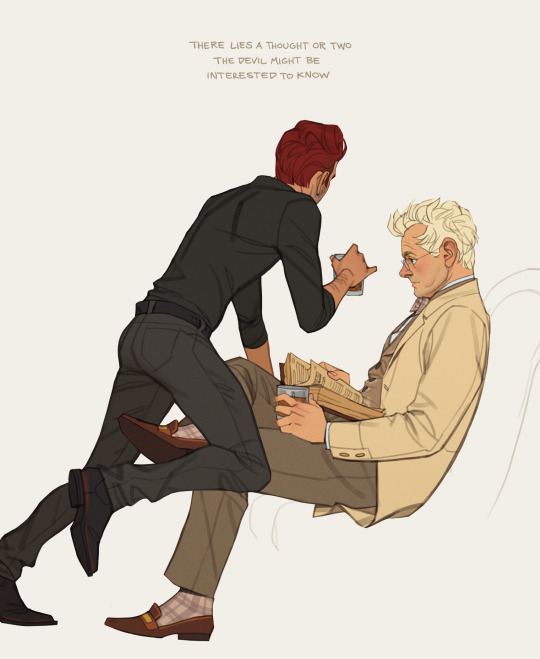
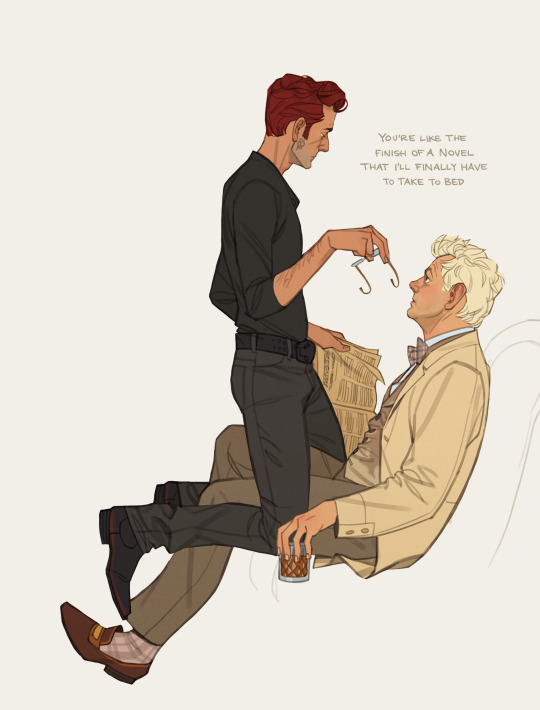
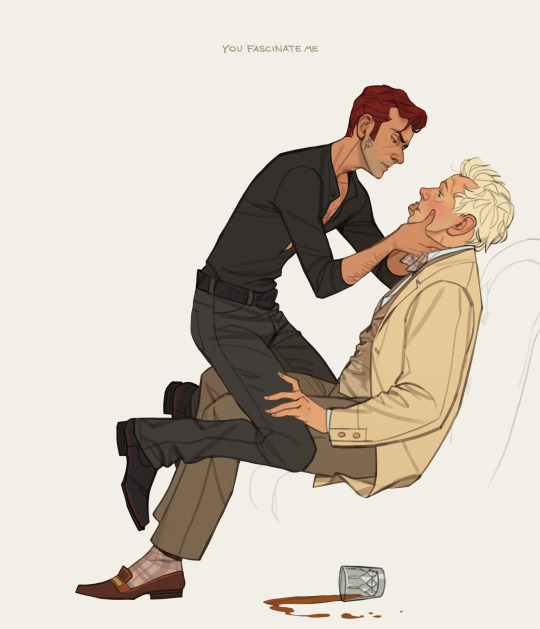

I have a feeling that beneath the little halo on your noble head
There lies a thought or two the devil might be interested to know
You're like the finish of a novel that I'll finally have to take to bed
You fascinate me so
You Fascinate Me So, Blossom Dearie
77K notes
·
View notes
Photo
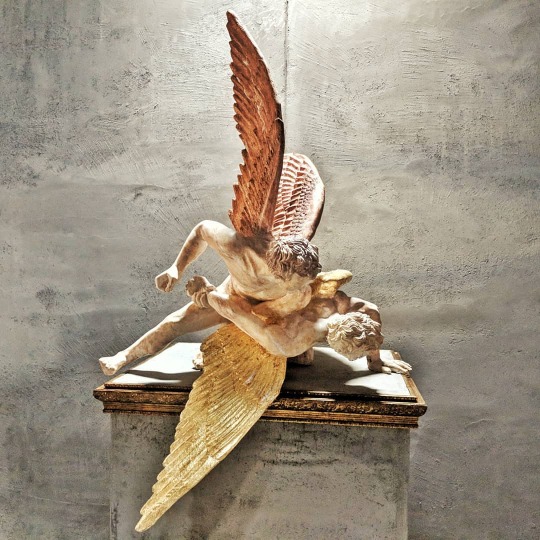
The statue in Crowley’s flat. “it represents,” said the Production Designer, Michael Ralph, “Good and evil wrestling with evil triumphing.” “…are you certain that they’re wrestling?” I asked.
17K notes
·
View notes
Text

@johnlocked1827384
Behold
The greatest nature documentary ever created
12K notes
·
View notes
Text

This is a humble work in progress of a freestyle watercolor loosely inspired by "From Eden" by Hozier + Crowley from Good Omens.
This is my first time posting my art on Tumblr in an actual post! (besides my cover image)
By the way... Fellow Good Omens + Hozier fans, please let me know if you know the answer to my burning question: did Hozier ever address the fact that the Good Omens fandom loves him? I've been trying to find if he ever talked about it in an interview or something, without success.
I know Neil Gaiman at least knows about this, because he has answered someone's question about whether he had coordinated the release of s2 with Hozier's album.
#From eden#Good omens#Hozier#Crowley#neil gaiman#Good omens and hozier#phophet hozier#Myart#Watercolor
33 notes
·
View notes
Text
Dear Tumblr -- I humbly say Hozier shouldn't play Jesus in s3
Hozier should play a prophet - he's the modern day Agnes Nutter
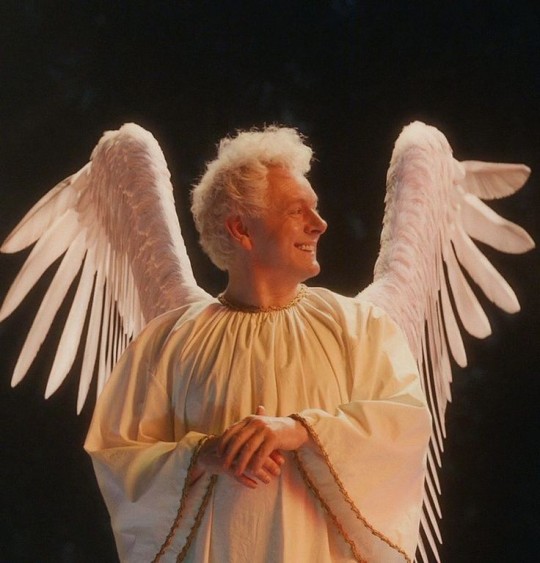
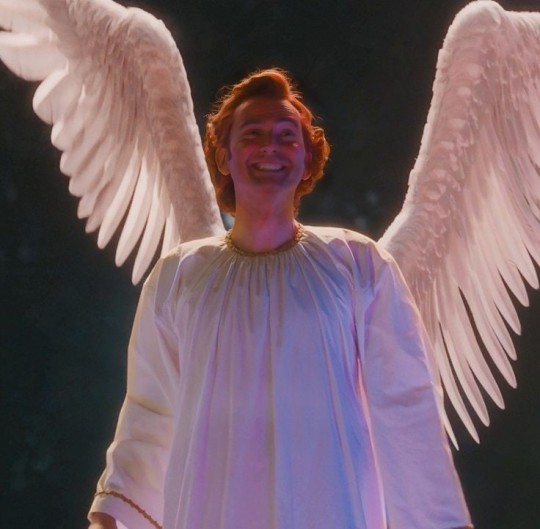

#hozier#good omens#good omens 2#unreal unearth#crowley#aziraphale#aziracrow#ineffable husbands#lets stop portraying jesus as a hot white dude#i don't think hozier would even like to play jesus#hozier seems to suffer from religious trauma too#good omens season 3
5K notes
·
View notes
Text
When the Zombie Nazis are explaining how they got to Hell to Furfur, Glozier describes Aziraphale as "a sissy type, a real fagelah", which is a slur calling Aziraphale a homosexual and meaning that in a derogatory way as, you know, Glozier is a Nazi... What is funny about it in the context of the scene is that the word is Yiddish, so the scene amounts to a British Nazi using Jewish words to slur homosexuals, in truly stupid fascist form lol. But that's not why I'm mentioning it. There's a Crowley & Aziraphale reason, as you'll see below.
Furfur's dialogue in the scene then also adds more humor when he tells them to be quiet for a second by telling them to "schtum"-- a British English slang word for "being quiet/keeping quiet" that is Yiddish and comes from the German word "stumm" aka "silence". It's telling Nazis to shut up using a word that has been taken into its own meaning by groups the Nazis have been attacking.
But the reason why I bring it up to you all is because the word "fagelah" means "little bird" and "schtum" means "silence" so the Yiddish in the 'Furfur meets the Zombie Nazis' scene translates to...
Silent little birds. Or, as we know it in Good Omens...

2K notes
·
View notes
Text
I don't agree with everything in this text but there are a lot of good insights. It's worth a read
Thoughts on Season 2 of Good Omens
I’m writing this little post to explain why I’m so crazy because if you’ve been following my tweets for a few days, you’re probably wondering why this person is so crazy.
I am not an atheist, nor am I a theist. In general, I reserve the idea of God because I recognize that it is a very meaningless exercise. If I had to choose a strict position on God, I would follow the opinion of the recently deceased Jean-Luc Nancy.
“Theism and atheism are just metaphysical symmetrical presuppositions about existence.”
From this premise, I like the phrase “Good Omens” because I think the writers who created them are certainly showing the best humor that people living in a monotheistic-Christian culture are capable of. The Christian dichotomy of the world they created, good and bad, is just a symmetry premise, like the Nancy quote above. Whether a symmetrical premise necessarily establishes an antithesis requires a bit more thought, but in this worldview, there is a strange antithesis. And they express it as bureaucracy. This is a very funny point because by its very nature, bureaucracy is a necessary condition for conflict and a sufficient condition for cooperation. And season 2 completely fulfills this proposition. So bureaucracy is a pretty fun environment and premise to be in, where there is a symmetrical premise of good and bad.
In this symmetry, humans are either marginalized or excluded. And there is an angel, and a former angel, who is confused between these symmetries. Two beings who see the symmetrical premise as a matter of choice…
The reason I thought this series was so unique is because it really speaks to the isolation we’ve been through over the last few years, and how it’s affected people (and why the hell we’ve been so understaffed). From the people who couldn’t pay their rent because the lockdown had just been lifted, to the hellish (dental) masks they wore in case they looked grotesque to others, to the relentless set photography that props up the series, to the actors who were willing to put in the work. I thought it was a (rather blatant) satire like Don’t Look Up until about halfway through (despite the presence of the final sequence in S2E6, all of these attempts stand up pretty well). As I said above, the series uses the symmetrical premise of the time-honored Christian tradition and the entanglement of “bureaucracy” in our reality to create a narrative, which makes it an appropriate series to show the situation and tragedy of our inevitable (or self-imposed) “isolation”. At least, that’s how I felt halfway through.
In the past few years, despite the harshness of the environment, there have been countless works, and the OTT industry has become a strange speciality. The rise of the dual (post-)apocalyptic genre (normal apocalypse is inevitably SF) has been interesting — it’s a great option that has a genre grammar that can be used to express the isolation we’re experiencing (and hopefully make it last), and people have found a lot of empathy and comfort in it. The kind of reassurance that we will be reunited and live and love again. (A number of factors lend themselves to thinking of Season 2 as sci-fi, and Season 1 was a quasi-apocalyptic show.) No other show, at least that I’ve seen, has made the pandemic so tangible.
Recent events aside, isolation is still a valid factor in the pandemic, and in that sense, love has always been effective. How many people and works have screamed over the years that it’s the sense of connection that can break the isolation (whether this message has worked in the real world… I’m not sure). Season 1, released in 2019, was about maximizing the benefits of “visualizing” the original. Everyone was delighted with the (belated) visualization of the Good Omens. At the time, I saw it as a tribute to the work and to the author who passed away. But now season 2 has taken a different turn (*not really a turn, more of a new opportunity to move away from the tribute aspect), pointing to a story about isolation, and a different look at what led to that isolation, which is probably why the pandemic was invoked.
I don’t know what Neil Gaiman intended (it’s a lie, and it’s painfully obvious), but I suspect he has a similar idea to mine: that what matters to humans is not whether there is a God or not, but how religion is practised. The result of the conventionality of religion is not (maybe) blindness, but “unawareness” itself. From beginning to end, (really fucking end!!!!!!) the work provides symmetry, and symmetry is derived from this symmetrical premise.
The repetition of the same group of figures (I wouldn’t go so far as to say they are surrogat of Aziraphael and Crowley), the angelic device of ‘Gabriel’ (ha-ha) and Beelzebub with his ‘face’ switched, the antics of God and Satan over God’s favorite ‘Job’, and the choice of Crowley and Aziraphael to stand between them. Or, the resurrectionist.
The superimposition of seemingly obvious elements all builds to a final moment: at a time when Crowley is feeling ashamed of Gabriel’s oblivion of his interest in the face-swapped Beelzebub (we don’t know why), the impact of the romance between the Archduke of Hell and Heaven’s Supreme fucking Arc Angel Gabriel on Crowley is enormous. This former angel, also the negligent demon was as cunning as a snake. While everyone else was looking on in disbelief at their respective bosses’ bluster, the clever snake saw a definite possibility. Just as they realize the possibility, the two humans they’ve been trying to unite come and whisper to them, “Speak”. There are countless self-replications of the same behavior in the series, such as this one. Like that moment when you fall unconditionally in love when you take shelter from the rain under the eaves, or the voice in Eden that whispered to you, “Desire”. Finally, demons can make up their minds. In fact, listening to the human story probably didn’t make Crowley the demon decide. It was the angel who helped him decide.

“They loved each other so much, and that love blinded them, that they never asked each other how they wanted to be loved.”
I think this is a euphemism because here I already think the power game (discussion) between them is never established in the first place. (More precisely, they can’t ask each other about love.) I re-watched the last sequence many times because I couldn’t believe my eyes. I couldn’t believe my eyes: the loose set-up, elements, and reasoning eventually culminate in the ultimate conflict. It’s not an Armageddon kind of conflict.
The conflict between the two manifests as “bureaucracy” because, by their very nature, they “must” be systems. They are born out of the symmetry premise, they are inevitably part of the system, and by virtue of being part of the system, they are pillars of the ‘structure’. The difference here goes back to the symmetry premise, as one is inherently and necessarily the defender of the system and the other is inherently and again, inherently the questioner/doubter of the system. As I said above, it’s not the presence or absence of a god that matters, but how religion conventionalizes people. In other words, whether or not we are able to recognize the structure itself, and whether or not we are able to detach from it and recognize the whole.
The ‘conventionalization’ of religion is not, strictly speaking, blindness, but ‘unconsciousness’. Therefore, the angel is a structure in itself, in its ‘unconscious’ and ‘unquestionable’ conventionality, and the ‘system’ that recognized the ‘structure’ has gone to hell. Therefore, the crawl is an anomalous system. And this relationship is the expression of bureaucracy. Including the union of the two. Those angels who were there when the pillars of structure created the universe, those angels who saw the possibilities of the universe and thought of other alternatives. But sadly, we know the truth: they are representations of bureaucracy itself, at the end of its symmetry.
When the angel hears Metatron’s offer, he is pleased. If he accepts Metatron’s offer, he can clear the name of the anomaly, the “doubting being,” and reinstate it as a “being” in its own right. That’s a level of authority, a conscious authority. All of this is again anomalous, and according to Metatron, Crowley, who disrupts the “order” with unnecessary questions, is unable to determine Aziraphael’s true intentions. This is true of Aziraphael as well. Whether or not Aziraphael can actually do it, it is not easy to change the structure within a bureaucracy represented by a structure. A witness to this is Crowley. But the ‘unsuspecting’ angel dares to change the structure because he loves him so much, and because that love can never be ‘wrong’. There is a wall here. An insurmountable wall between the seemingly romantic phrase “they love each other so much that it blinds them, so they never ask how they want to be loved”… Actually, this proposition is derived from the symmetry premise above. A wall between those who cannot be wrong and those who are made to be wrong. It is therefore (I dare say) inevitable that they should fall in love. For combinations of signs become ‘symbols’, and they manifest themselves in certain ‘omens’.
It was a very long story. The reason I have to tell this story so long is because I have seen possibilities in the faces of angels and in the faces of devils. If I had to name the greatest discovery or invention since the beginning of the history of video, I’d say it’s the close-up. Without having to explain the word close-up, the greatest thinkers have rallied around a concept that fills everyone’s minds. We can record human trembling!
After hearing Metatron’s proposal, the angel can’t contain his excitement. Metatron says, “Tell this story to your friends”. Aziraphael runs (emotionally). Crowley has been preparing the ‘confession’. Before the confession can take place, Aziraphael spits out an excited, almost confessional, praise of God. “Only, even nicer!” says Aziraphael in exultation. The matter of the unquestioning lottery. Was Crowley “conscious” of authority here? He asks again and again if The angel said no to Metatron’s offer.
We could have been us.
Crowley has a momentary flashback. Tears well up in his eyes… He’s in tears. At this point, Aziraphael falls into chaos. The close-up is an achievement, as we can see his fluttering pupils and quivering eyelids.
The confession is torn between disappointment and impossibility. Crowley ‘revisits’ the possibility that he has long sought but (ironically) never reached, only now, in the face of complete impossibility. Like their bosses, we can do it too. Like their bosses, we can do it too. Even when the love in front of him has taught him that ‘nothing lasts forever’, the desire never dies, but it surrenders (approaches) to a certain authority, an unconscious authority. All of Crowley’s acts, then, are trapped in a symmetry that can never be reconciled, even though he loves above all else. He cannot refute the angel who speaks of the impossible, so all he can say is ‘good luck’.
In fact, it is Aziraphael’s antithesis: ‘You don’t understand, no, I understand much better than you do.” I’m doing this for you, so why don’t you understand, and since there can be no such thing as angelic cries, I can only dismiss you as offended. Turning around and saying, “No nightingales,” Crowley puts an end to this love. There are no witnesses to the love, who witness the angels dining at the Ritz. (Despite my dislike of Michael Sheen, this scene is exquisite; it’s one of the few times we see Sheen’s face.) The angel’s confusion is beyond comprehension. Crowley’s “We could have been us” is a cry and a testimony. ‘We are both exceptional situations(conditions)’.
He grabs him by the scruff of the neck. Lips collide. We witness a clenched fist. The hands of an angel with nowhere to go. The lost hand cannot reach out to embrace its lover, because it is literally lost in all of this.
The lips part and the surprised angel says, “I forgive you.”
Forgive for what?
There’s a lot of thought going on here. Is it forgiveness for an unauthorized kiss? What makes forgiveness possible when there is nothing to forgive? If this constitutes forgiveness, what is next? But the devil says, “Don’t bother.” The devil stopped crying. There was the sound of a bell closing the bookshop door. Where the devil left off, the angel stares in surprise and confusion, breathing heavily and pursing his lips. His gaze is unfocused.
What I have seen, right here, is the beginning of sin. In other words, it’s the first anxiety that occurs to the angel. It is not merely a surprise, but the germination of another possibility. What is conceived here is the existence of a sexuality that was not possible (or necessary) for the angel. Søren Kierkegaard once spoke of “anxiety as the result of sin without guilt”. Surprisingly, this scene echoes Kierkegaard’s theology and philosophy of religion, as it is the moment of conception of original sin beyond Eve. “With the sinful nature, sexuality was established. At that moment, human history begins (…) The presence of original sin is anxiety.”
You don’t need to know what this means. To be honest, I don’t. But the moment of original sin was so intense that these words immediately came to mind. This can’t have been the first time Crowley and Aziraphael had touched. Crowley was forced to “give up” being with his one and only love because of his prior understanding that he could not “be an angel,” and he could not be made to understand that point. The system cannot persuade the structure.
But always, ‘events’ create a series of exceptional circumstances. The pebble that fell on the surface of the water created a ripple, and this ripple was the event that awakened the angel’s sexuality. Thus, Crowley had never before touched the angel in such a way. By not transmitting the trembling itself as an overt object of desire, the angel was transmitting overt sexual desire, and upon realizing this, the angel (being an angel, of course) must ‘forgive’ Crowley, for it was the harboring of desire that caused original sin, and with this original sin, sexual desire was born, and it was this that pushed Adam and Eve out of the Garden. For six thousand years, the fire-fist Aziraphael, the gatekeeper of Eden, has worn original sin! Along with sexuality. No wonder the angel was surprised by the demon’s touch, not because it was daredevil, but because it felt so “sexual,” and with it the understanding of “sexuality.” But in order for original sin to be established here, it must be the result of something happening within the individual that is not recognized as sin. The ‘consequence of sin without a consciousness of sin’, and therefore the point at which this emotion that I perceive as an expression of an order that can do no wrong, cannot be sin, is at the same time the sign of anxiety in Aziraphael’s eyes that proves that this is lust.
I talked about close-ups earlier. From the bust shot to the close-up, we hear the angel’s breath after the demon exits. Shaky vision, lips pressed against fingertips. (Even if I don't like Michael Sheen that much… the actor’s set-up for this entire sequence was so subtle that I couldn’t help but be overwhelmed.)
The aforementioned symmetry premise is rippled. Derived from the symmetry premise, the two Signs were determined (already in Season 1) to be anomalies to each other, but at least the incumbent Angel probably didn’t expect his anomaly to elicit this level of anomalous emotion, because he was a bureaucratic good (and a Sign) who couldn’t truly be an anomaly. That the two signs that saw the expulsion of Adam and Eve would result in this ‘repetition’ thousands of years later was unthinkable for an angel, much less a ‘demon’ who already had a sinful nature. I mentioned self-repetition earlier, and this is also self-repetition. If there is a variable here, it is that the angel was already an anomaly, and only he himself was unaware of it (not religiousizing, customizing, or conscious of goodness), and only the devil, who already knew of the presence of the demiurge in goodness (‘You really are a bastard’), gave the angel original sin by giving him a kiss of lust, by transmitting its tremors with his breath. I thought to myself. The only one who knows what he’s doing here is Crowley, the questioner/doubter. The lowly devil, at the moment of renouncing love, leaves having instilled a minimum of corruption, and therefore only the possibility of corruption. There is no more evil than this.
The angel breathes in, hard and fast, and sweeps a hand across his startled chest. It’s hard to tell why he’s crying, because there are so many assumptions involved, but here’s what’s happening. The devil cried, the angel cried, only the nightingales didn’t, because there was an abandonment of not only the opposition of the symmetry premise but of symmetry itself, which is to say, there was an abandonment of the ‘possibility of events’.
Funnily enough, however, I saw new possibilities right here, because the conventionalization of religion was shaken by the very moment when two people who loved each other too much that they never asked each other how they wanted to be loved, especially after the angel first recognized individuality, were infused with sexuality and acquired a sense of guilt. Here, religion would indeed become possible. And it can give birth to a new order and discipline. And I’ve replayed this scene dozens of times over the past few days because it’s so compelling and amazing. I don’t actually think Crowley has given up on loving Aziraphael. (I really don’t.)
It’s not an abandonment of love, it’s an abandonment of symmetry.
So I take this as confirmation that the story will no longer be told without sexuality between these two. This was a clear departure from season one.
All of this lust, angst, and potential sinfulness aside, Gaiman and the show’s intentions are clear. It’s a “bureaucracy” critique. It’s a critique of bureaucracy. Therefore, the series does not shy away from the “pandemic. Well, I don’t really need to make any predictions about what season 3 will be like, but let’s do it anyway: Crowley will probably run away from the problem (assuming there is a problem). Aziraphael will confront the problem… but not solve it.
But there is always an alternative. Ah, it would be love. So Crowley will personally (slink) down to heaven to rescue the troubled (trapped) angel. Such are the actions of those whose existence is a possibility.

I don't think I've ever analyzed a sequence with this much excitement. I've watched the series over and over again in the four days I've been writing this. I've seen it in other languages, not my mother language, too. It reminded me of my past life when I sat through Kierkegaard's seminar and said I had no idea what the hell he was talking about. Alas, Mr Kierkegaard, this is what it sounds like: the genesis of anxiety is clearly tied to guilt.
I honestly don't know why I wrote this post, but I wanted to excuse myself for having to buy and study the BL love scene. Honestly, I cried during the opening sequence of season 2. Because the stinging critique of 'a representative system' and 'bureaucracy', where the birth of the universe has been reduced to wallpaper for humanity, hurt. Here's the difference between Aziraphael and the other angels. For he recognizes that to doubt is to be 'risky', but the risk always includes 'adventure'.
The nameless angel at Aziraphael's side then could not love him 'yet', because he was (at least) then in a state of unconscious convention. But as a possibility, always as a seed, there was always the possibility of original sin, like Eve and Pandora in desire. The possibility of subversion.
Whether original sin is bad, whether guilt is bad, is another story, because, as the title of Good Omens suggests, all of these things (like the command to love because not to be sinful) are only premises, and humans live in the present.
("Anxiety is an expression of the fact that we are fully human.")
There are a lot of stories I wanted to tell but didn't. In fact, Gabriel and Beelzebub are the play's most important devices: they're the driving force behind the story, they're proof that their respective factions require cooperation, and they're Good Omens.
There's also the story of Nina and Maggie. They've been tossed around between the angel and demon, but because they're human, they're also descendants of Eve, and so they've learned desire from the beginning of time. They throw stones back at the one who awakens their desire, causing ripples. These are also Good Omens.
I didn't even tell the story of Metatron. Angels are better than anyone at emulating human emotions the higher up they get, and they're also better at erasing that humanity. I'd like to talk more about this point another time.
As I said at the outset, I'm neither a theist nor an atheist; I'm not ignorant of Christianity, but I know very little about it, and I'm sure I'll get a lot wrong, so bear with me. Thank you for reading this long post.
**English is not my primary language, so there will be a lot of errors, so please forgive me.
11 notes
·
View notes





























